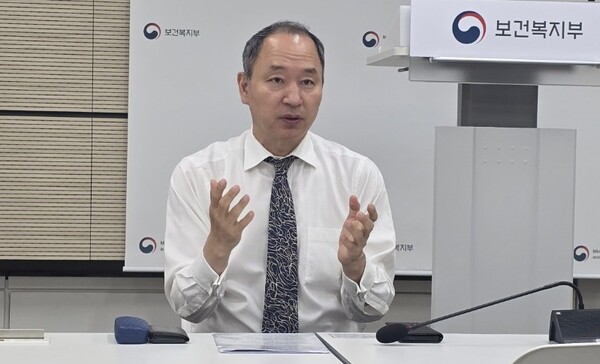The Ministry of Health and Welfare has formally asked the Ministry of National Defense to begin shortening the service period for public health doctors and military surgeons starting in 2029.
The number of public health doctors and military surgeons could drop below 100 by 2029, as more medical students opt for active-duty service over medical officer roles due to the longer service period required of the latter.

At a meeting with reporters from medical newspapers on Wednesday, Kwak Soon-heon, director-general of the Health Policy Bureau at the Health and Welfare Ministry, said the government must shorten the service period to address the shortage of public health and military doctors. Their mandatory service period is more than double that of regular soldiers.
Currently, public health and military doctors serve for three years, but including military training, their total service can extend to 37–38 months—more than twice that of active-duty soldiers, who serve for 18 months. While the military has shortened service periods and raised salaries for general soldiers through defense reform, treatment for medical officers has remained unchanged, sparking equity concerns.
More medical students are also choosing active-duty enlistment due to the ongoing conflict between the government and doctors over the plan to increase medical school admissions.
According to the Korean Association of Public Health Doctors, 1,882 medical students enlisted in active-duty or social service roles from January 2024 to February 2025, an increase of 849 percent from 162 in 2023.
The ministry warned that if the current trend continues, a “cliff” will occur in 2029, when the number of enlisted public health and military doctors is expected to drop sharply.
Doctors who resigned in protest of government policies last year were reorganized into the public health and military doctor workforce. As a result, the number of public health doctors assigned by the ministry is projected to decline from about 250 in 2024 to 200 in 2026, 150 in 2027, and 100 in 2028.
The ministry predicts that by 2029—when those assignments end—there will be just 77 public health doctors and 86 military surgeons. That figure remains well below the annual selection quota of 600 to 700 military doctors.
“We are in discussions with the Defense Ministry, sharing our data on future shortages,” Kwak said. “The defense side is also aware of the seriousness. Our request is to shorten the service period, and the message to medical students should clearly state that this will begin in 2029, when the cliff starts.”
“We can't reduce the current 36-month term all at once, but we need to signal that we’re starting to phase it down beginning in 2029,” he added. “2029 is the golden time. It’s important to commit to reducing the term starting that year.”
Kwak also said the government is considering improving treatment for public health doctors.
“In addition to shortening the term, we are working internally on measures to improve their treatment,” he said. “But improving conditions for public health doctors alone won’t solve the problem, because medical cadets can’t choose between public health and military roles.”
He added, “To discuss fair treatment, we have to look at both public health doctors and military surgeons. We’re working on it, but we’re not disclosing the plan yet.”
Although the Health Ministry has conveyed its concerns to the Defense Ministry, Kwak acknowledged it’s unlikely a policy change will happen in isolation.
“The Defense Ministry is aware of the seriousness but must consider broader defense policy,” he said. “It would be best if the reform is adopted under the next administration, and we hope for that. But it’s difficult to categorize this as solely a task for our ministry, even though it relates to public health doctors.”
On May 10, the Korean Medical Association proposed a healthcare policy ahead of the 21st presidential election. The proposal included reforms to healthcare governance, support for essential and community care, and a recommendation to reduce public health doctor service to 24 months. It also called for a new deployment appropriateness committee to revitalize the system.
The National Assembly is also moving forward. On May 13, Rep. Han Zee-a of the ruling People Power Party introduced amendment bills to the Military Service Act and the Military Personnel Act to reduce the mandatory service period for public health doctors and military surgeons from three years to two.
Related articles
- [Contribution] New government, same old healthcare problems?
- Public healthcare still failing rural areas after decades, doctors warn
- Bill proposed to cut mandatory service for public health, military doctors from 3 to 2 years
- Ahead of presidential election, calls for shorter service for public health doctors gain momentum
- Doctors question viability of presidential candidates' public med school plans
- More medical students choose active-duty service amid government-doctor standoff

